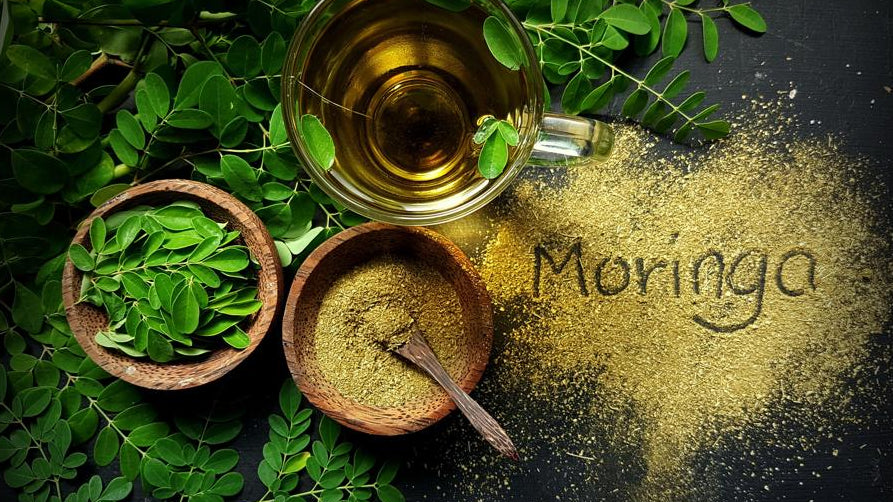I want to start by stating that I am neither a medical expert nor a dietician, nutritionist, or any other professional in this field. I am a tea lover, and lately, I have been enjoying a cup of either hot or iced Moringa tea every day. Being married to a Sri Lankan for 33 years, I have long heard tales about the benefits of eating the fruit of the Moringa plant and drinking the tea made from its leaves. Here in the United States, the availability of supplements derived from this plant is now booming. At Tea4usa, we stock an excellent variety of flavored Moringa infusions, including a beautiful selection pack of six flavors. Today, I wanted to explore the reasons behind the popularity of this plant.
Moringa tea, derived from the leaves of the Moringa oleifera tree, has been gaining popularity for its numerous purported health benefits. Known as the "miracle tree," moringa is packed with essential nutrients, antioxidants, and bioactive compounds. Also known as the Drumstick tree, the miracle tree, the Ben oil tree, or the Horseradish tree, people have used moringa for centuries due to its health benefits. If we believe everything we read, this seemingly magical plant can treat everything from skin irritations to upset stomachs and asthma, reducing high blood pressure and diabetes. Articles on WebMD, Medical News Today, Healthline, National Institutes of Health (NIH).gov, and Forbes Health, to mention a few, carry articles on the emerging evidence to support the health benefits of this plant.
While there are 13 species of moringa, moringa oleifera is the most commonly used due to its nutritional profile, according to Su-Nui Escobar, a registered dietician with a doctorate in clinical nutrition based in Miami. The moringa plant is traditionally used as food and an alternative medicine source. Moringa has many essential vitamins and minerals and is rich in nutrition owing to the presence of a variety of essential phytochemicals present in its leaves, pods, and seeds. Moringa is said to provide seven times more vitamin C than oranges, ten times more vitamin A than carrots, 17 times more calcium than milk, nine times more protein than yogurt, 15 times more potassium than bananas, and 25 times more iron than spinach. The fact that moringa is easily cultivable makes it a sustainable remedy for malnutrition. Countries like Senegal and Benin treat children with moringa.
- Rich in Nutrients
Moringa leaves are a powerhouse of vitamins and minerals. They contain high levels of vitamins A and C, calcium, potassium, and iron. Drinking moringa tea is an excellent way to boost your nutrient intake, especially if your diet lacks these essential vitamins and minerals. A cup of moringa tea can provide a significant portion of your daily requirements, helping to maintain overall health. Moringa oleifera leaves and seed pods are also regularly consumed as food worldwide. “The immature pods can be cooked and eaten like any other bean,” explains Yelena Wheeler, a registered dietitian nutritionist in Los Angeles. “The leaves are cooked and used within a meal. The rest can be dried to make a powder.”
- High in Antioxidants
Moringa tea is rich in antioxidants, including quercetin and chlorogenic acid. These antioxidants help neutralize harmful free radicals in the body, reducing oxidative stress and preventing cellular damage. Regularly consuming moringa tea can enhance your body's ability to fight off diseases and maintain optimal health.
- Anti-Inflammatory Properties
Inflammation is a natural response to injury or infection, but chronic inflammation can lead to various health problems, such as arthritis, cardiovascular diseases, and certain cancers. Moringa tea contains anti-inflammatory compounds that can help reduce inflammation in the body. This makes it beneficial for individuals suffering from inflammatory conditions.
- Supports Heart Health
Moringa tea can contribute to heart health in several ways. Its high antioxidant content helps lower bad cholesterol (LDL) levels and prevents plaque formation in the arteries. Additionally, the anti-inflammatory properties of moringa can reduce the risk of chronic heart conditions. Drinking moringa tea regularly can help maintain healthy blood pressure levels and support cardiovascular health.
- Boosts Immunity
The vitamins and minerals in moringa tea, particularly vitamin C and zinc, are crucial in boosting the immune system. A robust immune system is essential for fighting off infections and diseases. Incorporating moringa tea into your diet can help strengthen your immune defenses and keep you healthy.
- Enhances Digestion
Moringa tea can aid in digestion and improve gut health. This tea contains compounds that can help stimulate digestion and alleviate digestive issues such as bloating, gas, and constipation. Its anti-inflammatory properties also benefit the digestive tract, promoting overall gastrointestinal health.
- Regulates Blood Sugar Levels
Moringa tea has been found to have hypoglycemic properties, which can help regulate blood sugar levels. This is particularly beneficial for individuals with diabetes or those at risk of developing the condition. Drinking moringa tea can help maintain stable blood sugar levels and reduce the risk of diabetes-related complications.
- Promotes Healthy Skin
Moringa tea's high vitamin A and antioxidant content can promote healthy skin. Vitamin A is essential for skin repair and regeneration, while antioxidants protect the skin from damage caused by free radicals. Regularly consuming moringa tea can result in clearer, healthier, and more youthful-looking skin.
- Boosts Energy Levels
Moringa tea is known for its ability to boost energy levels naturally. The combination of essential nutrients and antioxidants helps improve metabolism and increase energy production in the body. Unlike caffeinated beverages, moringa tea provides a steady and sustained energy boost without the jitters or crashes.
- Supports Weight Management
For those looking to manage their weight, moringa tea can be a helpful addition to their diet. The tea is low in calories and can help suppress appetite, making it easier to control food intake. Additionally, its beneficial effects on digestion and metabolism can aid in weight loss efforts.
Conclusion
Moringa tea is a nutritious and beneficial beverage that significantly enhances your well-being. Folk medicine has used this plant's leaves, flowers, seeds, and roots for centuries. The advantages of drinking moringa tea appear extensive, from boosting immunity and supporting heart health to promoting healthy skin and aiding in digestion. So far, much of the research on moringa has used animals as test subjects; therefore, we are curious if the results would be the same with humans. Still, we know that the history of its incorporation as a dietary supplement is extensive.
As I stated at the beginning, I am no expert. However, I am enjoying my daily cup of Moringa tea, and I feel good. If nothing else, it is a caffeine-free alternative to other choices. Moringa appears to have few or no side effects. However, anyone considering using moringa or any other herbal supplements and tonics should discuss it with a doctor, as it may interact with other medications.
As always, Happy brewing,
Jane
Reference
Kasolo, Josephine N., et al. "Phytochemicals and uses of Moringa oleifera leaves in Ugandan rural communities." (2010). nru.uncst.go.ug
Lakshmipriya Gopalakrishnan, Kruthi Doriya, Devarai Santhosh Kumar, Moringa oleifera: A review on nutritive importance and its medicinal application, Food Science and Human Wellness, Volume 5.2 (2016): 49-56.
Mackelden, Amy, “Moringa: Benefits, Side Effects, And Risks,” Forbes Health, https://www.forbes.com/health/nutrition/moringa/ Updated: Oct 18, 2023. Accessed 6/19/2024
Rockwood, J. L., B. G. Anderson, and D. A. Casamatta. "Potential uses of Moringa oleifera and an examination of antibiotic efficacy conferred by M. oleifera seed and leaf extracts using crude extraction techniques available to underserved Indigenous populations." International Journal of Phytotherapy Research 3.2 (2013): 61-71.
